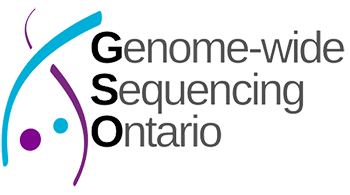All test orders will be reviewed by a SickKids or CHEO genetic counsellor to ensure that the Genome-Wide Sequencing (GWS) application requirements and clinical eligibility criteria are met.
Application requirements
- All patients for whom GWS is ordered must meet the MOH patient eligibility criteria for funding as outlined in the requisition.
- Prior to submitting a case to GSO, all clinically indicated investigations must be completed (e.g. microarray). The application should outline the results of these investigations and prior genetic testing.
- Incomplete applications may delay review and adjudication of test approval, as well as turnaround time. Test orders with incomplete information will not be processed; the laboratory will store the sample and request additional information prior to initiating testing.
Clinical eligibility criteria
- All test orders will be reviewed by a SickKids or CHEO genetic counsellor.
- Test orders that may not meet the clinical eligibility criteria will be reviewed by the GSO Joint Review Committee consisting of, at minimum, one clinical geneticist, one clinical molecular geneticist, as well as one genetic counsellor from each site. The committee members will be blinded to the origin of each test submission and will determine the eligibility of the case based on the clinical information provided. Ordering physicians will be notified if a request does not meet criteria for GWS. Providers may appeal decisions by submitting additional clinical information and justification for the test to the joint committee.
- If a comprehensive gene panel (i.e., ≥100 genes or where all known disease gene relationships are assessed) has been completed in the past three years and did not identify a causative pathogenic variant but there is a strong argument to be made for GWS, a letter providing the exceptional circumstances of the case, in addition to the usual documents for review (e.g., evolution of the phenotype, pregnancy), must be included.
- If you have a patient for which you would like to order GWS, but you are unsure if they meet the current clinical eligibility criteria, please reach out the laboratory genetic counsellors at gso@cheo.on.ca (CHEO) or gso.requests@sickkids.ca (SickKids).
Review process
When specimens and required documents are received at the GSO laboratory, the request is reviewed by the laboratory staff.
- If documentation is incomplete, the ordering provider will be informed of the incomplete order.
- If documentation is complete and the patient meets the clinical criteria for testing, testing will proceed.
- If the patient does not meet the clinical criteria for testing, testing will not proceed, and the provider will receive a report indicating that the patient has not been approved for genome-wide sequencing.
- If the test request is denied, the provider may choose to submit an appeal.
Analysis strategy
Testing should be completed on the affected individual. Additional affected relatives or unaffected parents, when available, can be analyzed concurrently to facilitate and improve variant interpretation:
- Trios (proband and both biological parents) are the preferred GWS analysis strategy for all undiagnosed patients, with a few exceptions. Parental samples when possible, should be submitted alongside the proband sample to allow concurrent analysis.
- If parents are not available for concurrent analysis, other sequencing strategies can be considered and samples from alternate family members may be submitted for concurrent analysis.
- If autosomal recessive inheritance is suspected, including in the context of consanguineous families, samples from additional affected individuals (e.g., sibling) may be submitted for concurrent analysis in addition to the parents.
- If X‐linked inheritance is suspected, both parents should still be included for trio analysis when possible. If a better suited targeted X-linked panel is available, the panel approach should be prioritized. In very rare instances of clear X-linked inheritance, samples from other family members may be submitted for comparative analysis, after discussion with the diagnostic laboratory.
- In instances of very clear autosomal dominant inheritance, samples from different family members may be helpful in the analysis and can be submitted for comparative analysis after discussion with the diagnostic laboratory.
- If a disorder associated with variants in the mitochondrial genome is suspected, a targeted clinical test designed to assess the mitochondrial genome should be performed.
- If the patient has a phenotype highly specific to a known genetic condition for which an optimized genetic panel exists, or for which all known gene‐disease associations can be assessed, a targeted gene panel should be given priority assuming it is more sensitive (e.g., Noonan spectrum disorders).
- Please note, a separate analysis is not performed on samples from family members; they are used for the purposes of interpreting the proband’s results.

